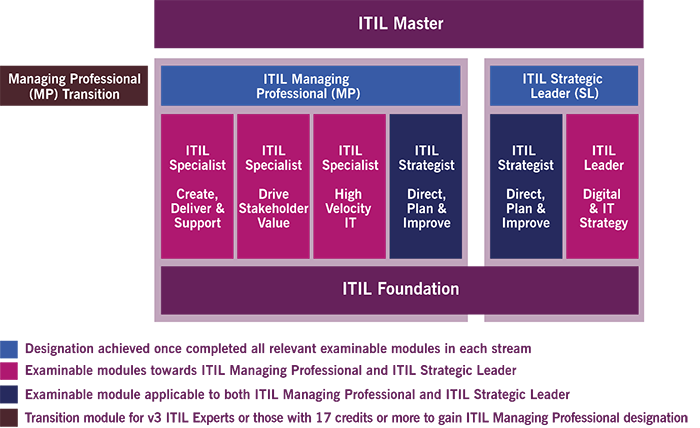ITIL certification and its global recognition
ITIL certification is a globally recognised qualification in IT service management. Certification in ITIL demonstrates knowledge of ITIL best practices and standards. ITIL certificates are designed for IT professionals seeking certification, including ITIL 4 certification and ITIL practitioner certification. Certified ITIL individuals can take ITIL certification classes or ITIL certification courses online or in person. ITIL certification cost varies by provider, while ITIL certification tests and ITIL certification practice tests help in preparation.
ITIL training, courses, and test preparation
Training in ITIL covers ITIL framework, ITIL foundation certification, and ITIL professional certification. ITIL certification programs and ITIL certification providers offer comprehensive resources, ITIL study guides, and management training modules. The ITIL official certification aligns with organisational objectives, risk management, and continual improvement. ITIL service management focuses on roles, lifecycle, and delivering excellence in IT services.
The ITIL qualification path and programme content
The ITIL qualification path includes ITIL expert certification and ITIL strategic leader certification. Training, learning, and assessment modules that address asset management, configuration, cloud services, and security are included. Tests are designed to equip candidates with strong capability, real-world application, and high velocity response in modern IT environments.
ITIL ecosystem and career impact
The ITIL certification program involves management, governance, and collaboration between stakeholders, managers, and partners. ITIL v4, PRINCE2, and AXELOS are key entities in the ITIL ecosystem. Achieving ITIL certifications demonstrates mastery in ITIL, supporting career development and organisational success.
Understanding ITIL certification and its value
ITIL certification remains a leading qualification for professionals working in IT service management and operations.
What ITIL certification demonstrates for your career?
ITIL certification demonstrates an individual’s understanding of service management concepts and practical approaches to improve operational efficiency.
How certification maps to job roles
Employers often map ITIL qualifications to roles such as service desk manager, IT project manager and configuration management specialists.
How ITIL supports organisational strategy
Adopting ITIL practices helps organisations align IT services with business needs and improve stakeholder value through structured processes.
Key benefits of ITIL certification for professionals
Certified individuals typically bring clearer process ownership, improved incident and problem management, and better service level management outcomes.
Which levels of ITIL certification are commonly pursued?
Candidates often start with the foundation test and progress to specialist or strategist modules to develop advanced service design and delivery skills.
How ITIL certification improves IT governance
ITIL qualifications provide a framework that complements IT governance and information security management, supporting compliance and risk management.
Choosing the right ITIL certification program
Selecting the right ITIL certification program depends on career goals, existing skills and the learning format you prefer.
Compare classroom training and online courses
Classroom training or instructor led training offers interaction, while online courses and e-learning provide flexible pacing and wider access.
What to look for in an accredited training provider?
Choose providers that are accredited and include official materials, practice tests and experienced trainers to boost test readiness.
Is blended learning suitable for working professionals?
Blended learning combines virtual classroom sessions with self-paced modules to balance hands-on guidance and flexible study.
How cost and voucher options affect programme choice
Consider total expenses, available vouchers and whether a package includes tests, practice materials and post-course support.
Which delivery formats support high-velocity learning?
Short, focused modules with practical case studies support rapid competency building and are ideal for busy teams and individual learners.
Preparing effectively for the ITIL certification test
Preparation for the test should balance conceptual study, practical exercises and timed practice tests to build confidence.
How to structure your study plan
Create a study plan that sequences foundational topics, followed by specialist modules and revision with mock tests.
Which resources accelerate test readiness?
Official guides, practice questions, instructor feedback and targeted study guides help candidates pass within fewer attempts.
How many practice tests should a candidate take?
Multiple timed tests, ideally mimicking the 60 minutes or specified test duration, improve pacing and passing rates.
Can e-learning replace instructor support for difficult topics?
High-quality e-learning can cover many topics, but complex subjects such as service transition and configuration management often benefit from instructor insight.
How to use case studies in test prep
Analysing real-world case studies helps candidates translate theoretical guidance into practical problem solving for tests and workplace application.
Designing training for ITIL certification at scale
Organisations designing training programs must balance cost, learning outcomes and alignment with strategic objectives.
What makes a scalable ITIL training curriculum?
A scalable curriculum uses modular content, clear learning objectives and assessment points to measure competency across roles.
How to integrate ITIL training with project management
Integrating ITIL with project management and Agile practices such as Scrum enhances service delivery and operational effectiveness.
Should organisations prefer certified trainers?
Certified trainers and accredited partners provide recognised expertise, standardised materials and consistent assessment practices.
How to measure ROI from ITIL certification programmes
Measure ROI by tracking improvements in incident resolution time, service level agreements and customer satisfaction metrics.
What role do learning platforms play in certification delivery?
Learning platforms host resources, track learner progress and support blended learning with virtual classroom sessions and on-demand modules.
Roles and career pathways after ITIL certification
ITIL certification opens pathways to roles such as service manager, ITSM analyst, configuration manager and strategic leader positions.
How ITIL certification affects salary and opportunities
Many professionals report improved job prospects and higher salaries after obtaining recognised ITIL qualifications.
Which roles benefit most from foundation-level certification?
Roles that require broad service management knowledge, such as service desk staff and operations analysts, gain immediate value from foundation-level study.
How specialist modules support career progression
Specialist modules — for example in service strategy or continual improvement — prepare candidates for senior roles and leadership tracks.
What complementary certifications add value?
Complementary certifications like PRINCE2, CompTIA or DevOps Institute credentials strengthen project and technical skills alongside ITIL knowledge.
How to build a long-term development path
Plan progressive certification steps, accumulate credits and aim for higher-level designations such as managing professional or strategist credentials.
Practical skills taught by ITIL certification
ITIL certification emphasises skills in incident management, change control, configuration management and service lifecycle thinking.
Which practical skills are covered on tests?
Test application of processes, ability to manage risk, and effective use of tools to support service delivery and improvement.
How to demonstrate competence in configuration management
Practical exercises, labs and documentation projects show proficiency in maintaining accurate IT asset management and configuration records.
How service level management is addressed
Training covers negotiation of SLAs, monitoring of performance and techniques to maintain or improve service quality.
Which analytical skills support ITIL roles?
Analytical skills such as root cause analysis and capacity planning are essential for driving measurable improvements and reporting value to stakeholders.
How to use governance and compliance in daily work
Governance and compliance topics ensure that security, privacy and regulatory requirements are considered within service design and operation.
Selecting materials and study aids
Study aids that practical scenarios improve test relevance and workplace applicability.
Which official materials should you trust?
Official publications and accredited study guides from recognised institutes such as PeopleCert and AXELOS are primary sources for test content.
How do blogs and community resources help?
Blogs, practice question sets and community forums provide additional perspectives, sample questions and study tips.
What formats suit different learners?
Some candidates prefer instructor-led training, others benefit from self-paced online modules and downloadable materials.
How to use practice questions effectively
Use timed practice tests to identify gaps, then focus revision on weaker topics and retake tests to track improvement.
How to ensure materials are up to date
Verify publication dates and accreditation status to ensure materials reflect the latest ITIL version and test structure.
Maintaining certification and long-term value
Maintaining certification value requires continuing learning, practical application and alignment with evolving service management trends.
How to apply ITIL practices in daily operations?
Apply guiding principles, continual improvement and service lifecycle methods to deliver consistent operational improvements.
What continuous learning options exist?
Options include refresher courses, advanced modules, workshops and in-house coaching to keep skills current and applicable.
How to measure ongoing impact
Track KPIs like incident response time, customer satisfaction and operational cost savings to quantify certification impact.
How does accreditation affect organisational adoption?
Organisational accreditation and recognised certificates make it easier to standardise practices and onboard new employees.
What future trends will shape ITIL value?
Trends such as cloud services, automation and integration with Agile and DevOps practices will continue to evolve ITIL application and value.
Frequently asked question: How long does it take to prepare?
Preparation time varies by level; foundation study may take days or weeks, while advanced modules require months of focused study and experience.
Study schedules that include blended learning and practical application shorten the time to proficiency while maintaining depth of knowledge.
Frequently asked question: Is ITIL certification recognised worldwide?
Yes, ITIL certification is internationally recognised and used by employers across sectors to validate service management knowledge and skills.
Recognition is strongest when certification comes from accredited providers and official examination bodies.
Frequently asked question: What test formats are common?
Test formats range from multiple-choice tests to scenario-based assessments depending on the module and certification level.
Timed tests with standard passing criteria ensure consistent candidate evaluation across providers and countries.
Practical checklist to prepare for ITIL certification
Create a checklist that includes official materials, practice tests, scheduled study blocks and a review of key service management concepts.
Include checkpoints for configuration management, change management and service level objectives to ensure broad coverage.
How to use training budgets efficiently
Prioritise accredited courses that include test vouchers and focused practice materials to reduce repeated test costs and maximise learning outcomes.
Leverage bulk training packages or corporate bundles when upskilling teams to lower per-candidate expenses.
How to choose between programs that claim to be the best
Evaluate providers on accreditation, trainer expertise, pass rates and the availability of practical, role-based learning resources.
Seek references and case studies from organisations similar to yours to understand outcomes and applicability.
How to demonstrate ITIL value to stakeholders
Present measured improvements such as reduced downtime, faster incident resolution and increased customer satisfaction to justify training investments.
Link certification outcomes to business strategies and measurable KPIs that stakeholders care about.
How to combine ITIL with other frameworks
Combine ITIL with Agile, DevOps and governance frameworks to provide a comprehensive approach to delivering and supporting services.
Integrating methods like Lean practices and PRINCE2 aligns delivery, operations and strategic planning for better outcomes.
Final considerations: ITIL certification adds structured processes, recognised skills and a shared vocabulary that support improved IT service outcomes and career progression.
For most professionals and organisations, investing in accredited ITIL training and applying learned practices yields measurable benefits in efficiency, governance and stakeholder satisfaction.
ITIL certification, when combined with complementary skills and ongoing learning, remains a durable foundation for service management excellence.
Practical applications of ITIL certification in organisations
ITIL certification demonstrates measurable value when its principles are applied within operational teams and project environments.
Applying ITIL concepts in service delivery
Organisations use ITIL certification knowledge to streamline service delivery, manage incidents efficiently and maintain effective communication across departments.
How ITIL supports configuration management and change control
Certified teams apply structured configuration management practices, supported by clear change management procedures, ensuring reliable service transitions and minimal disruption.
Integrating ITIL with digital transformation strategies
By aligning ITIL with transformation initiatives, organisations can modernise IT infrastructure, introduce automation and improve collaboration among IT professionals and stakeholders.
Enhancing governance and risk management frameworks
Using ITIL within governance models helps balance agility with control, enhancing risk management and information security management for consistent regulatory compliance.
Improving customer experience through ITIL processes
Customer-focused service management, supported by ITIL-certified professionals, leads to improved satisfaction, faster response times and better problem management outcomes.
Measuring efficiency and continual improvement
Through service metrics, performance indicators and feedback analysis, ITIL practices support continual improvement, aligning IT goals with wider business objectives.
The future of ITIL certification and emerging trends
The ITIL certification framework continues to evolve as new technologies and methodologies reshape the landscape of service management.
Adoption of automation and artificial intelligence
Automation and AI are influencing how service management tools operate, allowing professionals with ITIL qualifications to implement predictive analytics and self-healing systems.
How sustainability and green IT practices intersect with ITIL
Modern ITIL certification programs now emphasise sustainability by promoting resource efficiency, ethical governance and environmental awareness in IT operations.
Integration with DevOps and Agile practices
Future-ready organisations integrate ITIL with DevOps and Agile frameworks to create flexible service pipelines that maintain governance while delivering innovation quickly.
ITIL’s role in supporting cloud-based service models
As cloud adoption increases, ITIL-certified professionals manage hybrid environments and ensure that service delivery remains consistent, secure and measurable across platforms.
Why continuous learning sustains long-term ITIL value
Maintaining ITIL certification through ongoing learning ensures professionals remain updated on emerging frameworks, new modules and the latest accredited training standards.
Conclusion
Across organisations worldwide, ITIL certification continues to serve as the foundation for structured, reliable and customer-focused IT service management.
Its alignment with Agile, DevOps, cloud and sustainability initiatives reinforces its relevance in a fast-evolving digital environment.
For professionals, maintaining ITIL qualifications and applying its principles in practice ensures continual development, enhanced capability and recognised expertise in IT service management.
With strong governance, collaboration and strategic integration, ITIL certification remains the benchmark for excellence in delivering and supporting modern IT services.







